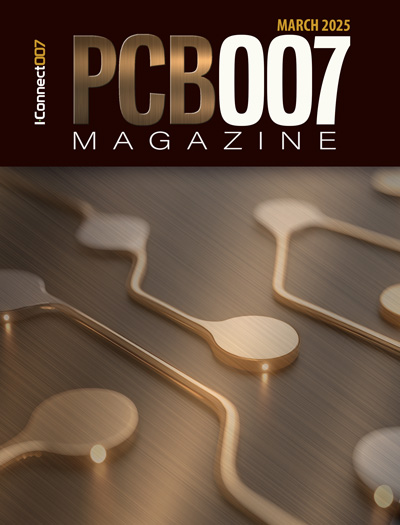-

- News
- Books
Featured Books
- pcb007 Magazine
Latest Issues
Current Issue
Voices of the Industry
We take the pulse of the PCB industry by sharing insights from leading fabricators and suppliers in this month's issue. We've gathered their thoughts on the new U.S. administration, spending, the war in Ukraine, and their most pressing needs. It’s an eye-opening and enlightening look behind the curtain.

The Essential Guide to Surface Finishes
We go back to basics this month with a recount of a little history, and look forward to addressing the many challenges that high density, high frequency, adhesion, SI, and corrosion concerns for harsh environments bring to the fore. We compare and contrast surface finishes by type and application, take a hard look at the many iterations of gold plating, and address palladium as a surface finish.

It's Show Time!
In this month’s issue of PCB007 Magazine we reimagine the possibilities featuring stories all about IPC APEX EXPO 2025—covering what to look forward to, and what you don’t want to miss.
- Articles
- Columns
Search Console
- Links
- Media kit
||| MENU - pcb007 Magazine
Germany Latest EU Country to Introduce Due Diligence Rules
June 22, 2021 | IPCEstimated reading time: 2 minutes
On 11 June 2021, the German Supply Chain Act was adopted by the German Parliament by a large majority, introducing binding human rights and environmental due diligence obligations for companies. After lengthy and difficult negotiations, the political groups found compromises on several key aspects of the law ranging from the scope of companies covered to the question of liability. The aim of the law is to foster responsible business conduct and remove illicit practices such as child labour from supply chains.
Once formally signed, the law will require large German companies as well as foreign companies with branches in Germany to identify and address human rights and certain environmental risks in their own as well as in their direct suppliers’ operations. While the due diligence obligation is limited to direct suppliers, companies will have to take measures if they are made aware of potential abuses in any part of their supply chain, for example via a complaint. Companies will have to regularly conduct a risk assessment, implement preventive measures where needed and annually report on their due diligence processes.
The due diligence duty builds on the UN Guiding Principles on Business and Human Rights. Its thematic scope encompasses human rights and labor rights as expressed in ILO conventions as well as the following environmental conventions:
- The Minamata Convention on Mercury
- The Stockholm Convention on Persistent Organic Pollutants
- The Basel Convention on the Control of Transboundary Movements of Hazardous Waste
In case of violations, companies will face administrative fines of up to 800 000 EUR or two percent of annual revenue and potential exclusion from public procurement for up to three years.
The German Supply Chain Act does not create a liability regime for companies – an important aspect that was clarified in the political negotiations. It does, however, enable trade unions and NGOs to initiate legal proceedings against companies on behalf of victims.
The law will be implemented in two phases: from January 2023, companies with more than 3 000 employees will have to abide by the new rules; and as of January 2024 the threshold will be lowered to companies with more than 1 000 employees.
For Germany, the law presents a paradigm shift, away from voluntary CSR initiatives towards binding due diligence obligations. Several other Member States already have due diligence laws in place or are contemplating introducing such laws. In parallel, the pending EU proposal on Sustainable Corporate Governance (SCG) and Due Diligence legislation is expected in the second half of this year. With this pending proposal, the European Commission aims to create legal certainty across the Union by introducing a harmonized set of rules applicable across Member States.
IPC continues to engage with policymakers on this topic to advocate on behalf of the electronics industry for a framework that is feasible and workable for industry while protecting human rights and the environment.
Suggested Items
ASMC 2025 Showcases AI and Emerging Technologies Shaping the Future of Semiconductor Manufacturing
04/15/2025 | SEMIThe 36th annual Advanced Semiconductor Manufacturing Conference (ASMC) 2025 will be held May 5-8, 2025, in Albany, New York, bringing together leaders in semiconductor manufacturing to explore cutting-edge advancements driving high-volume production and AI-powered innovation.
Real Time with... IPC APEX EXPO 2025: GreenSource's Growth and Future Developments
04/15/2025 | Real Time with...IPC APEX EXPOThings are looking bright for GreenSource. Michael Gleason shares an update on GreenSource's recent growth and upcoming changes. A recipient of a Defense Production Act Investment Program award, GreenSource is planning for new substrate capabilities. Current investments continue to enhance equipment and sustainability initiatives such as water quality. And their unique collaboration with the University of New Hampshire continues to aid their workforce development, despite recruitment challenges.
Real Time with... IPC APEX EXPO 2025: Exploring LCP Materials with Matrix Electronics
04/15/2025 | Real Time with...IPC APEX EXPONolan Johnson introduces Robert Berg from Matrix Electronics, highlighting the company's focus on high-speed, low-loss flexible materials, especially LCP materials. LCP (liquid crystal polymer) is a thermal plastic with unique properties that make it ideal for advanced PCB applications. Despite processing challenges, its stability and FDA approval for medical use drive interest in aerospace and medical markets.
Explore TRI's Test and Inspection Innovations at ElectroneX
04/15/2025 | TRIGPC Electronics, TRI's industry partner, will participate in the ElectroneX Electronics Design & Assembly Expo 2025 at the Melbourne Convention & Exhibition Centre, Australia, on May 7–8, 2025.
IPC Welcomes Exemptions to Reciprocal Tariffs
04/14/2025 | IPCIPC shared the following statement today on tariff exclusions and their implications on the global electronics industry. This statement can be attributed to Dr. John W. Mitchell, IPC president and CEO:


